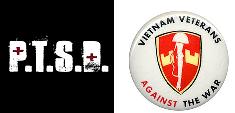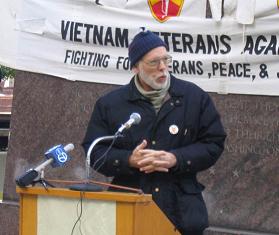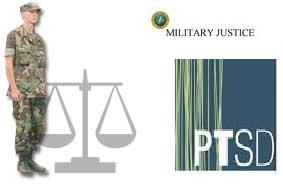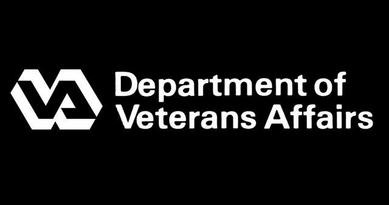 I ran across two articles in the latest edition of Vietnam Veterans Against the War (VVAW) The Veteran – Spring 2010 – newsletter both written by VVAW ‘s veterans benefits counselor Ray Parrish.
I ran across two articles in the latest edition of Vietnam Veterans Against the War (VVAW) The Veteran – Spring 2010 – newsletter both written by VVAW ‘s veterans benefits counselor Ray Parrish.
Note: The P.T.S.D. portion of this image is a logo for the upcoming film production by the same name Copyright LeviathanBlue Films LLC – http://www.leviathanblue.com. We have received copyright approval to use and display the logo, and we hope to be working with the producer of the movie to help promote the film. MORE TO COME. Major Hanafin.
Though of course more experienced than I in the VA Claims and Appeals process as a long time Veterans Service Officer, regardless Ray and I share a similar concern that needs addressing.
Who do Veterans, and even active duty troops, turn to when they have questions or need assistance filing VA or related claims, and their views on their war GET IN THE WAY.
In addition, who do younger Veterans with Personality Disorder and Bad Conduct discharges turn to for advise and assistance when PTSD has played a role in the type of discharge they got?
Pretty much most of the traditional Veterans Service Organizations desire Veterans to either blindly support the wars in Iraq and Afghanistan or at a minimum remain SILENT and leave their views on their war AT THE DOOR, or is that OUT THE DOOR before they will even talk to you.
 Either way, young Iraq and Afghanistan Vets who just happen to QUESTION not only most aspects of the wars, but their role in the wars (Iraq Veterans Against the War – IVAW comes to mind) are going to need access to like minded mentors and peers who, putting it mildly, understand the VA system.
Either way, young Iraq and Afghanistan Vets who just happen to QUESTION not only most aspects of the wars, but their role in the wars (Iraq Veterans Against the War – IVAW comes to mind) are going to need access to like minded mentors and peers who, putting it mildly, understand the VA system.
 We at VT News Network passionately support the efforts of VVAW, Ray Parrish, and Therapist Hans Buwalda to reach out and expand services nation-wide to those Veterans who question not only the wars, but their role in them to be able to seek VA Claims and related assistance without feeling they have to leave their views OUT THE DOOR or AT THE DOOR. However both Ray and Ms. Buwalda are quick to point out that they intend providing service to ANY VETERAN regardless what their views on their war are.
We at VT News Network passionately support the efforts of VVAW, Ray Parrish, and Therapist Hans Buwalda to reach out and expand services nation-wide to those Veterans who question not only the wars, but their role in them to be able to seek VA Claims and related assistance without feeling they have to leave their views OUT THE DOOR or AT THE DOOR. However both Ray and Ms. Buwalda are quick to point out that they intend providing service to ANY VETERAN regardless what their views on their war are.
Ray and Buwalda continue to seek volunteer Mental Health personnel, Psychiatrist, Psychologist, and even medical students who’s views on the war more close jive with that of the Veterans they will serve.
These young men and women have experienced, and are going to continue experiencing, what most Vietnam Vets who sought or needed access to the VA system felt when we came Home to War – isolated and discriminated solely based on their views about the war they fought or served in. This isolation is what gave rise to the Vietnam Vet Centers of the mid to late 1970s.
We foresee a rise in Iraq and Afghanistan Vet Centers – outside the VA system that will one day be part of the system when the established VSOs control over access to the VA has diminished. If this were not true there would never have been a Vietnam Veterans of America (VVA) or need for Iraq and Afghanistan Veterans of America (IAVA) to provide access to the VA dominated by the old line VSOs.
Though not as bad as post-Vietnam, given the outpouring of support for our troops and thus far the trends of our society to not blame our troops for the wars, however the notion that those who fought for everyone to be able to express their views on war, or anything else, are discriminated against by VSOs and the VA is unconscionable.
Robert L. Hanafin, Major, U.S. Air Force-Retired, VT News Network
“Bad Discharges,” PTSD & VA Benefits by Ray Parish and Hans Buwalda
Character of Service
 Many Veterans suffer from PTSD so severe that they go AWOL/UA or their behavior results in UCMJ charges for misconduct and they get less than honorable military discharges.
Many Veterans suffer from PTSD so severe that they go AWOL/UA or their behavior results in UCMJ charges for misconduct and they get less than honorable military discharges.
The VA can use this to deny treatment and benefits by saying it shows “dishonorable service;” a statutory bar to benefits. Often the VA personnel tell these vets that they must get their discharges upgraded before the VA can help them.
THIS IS WRONG in most cases!!
Properly presented evidence will enable vets with a service connected mental disorder to get VA treatment & disability benefits (except GI Bill) if they have an old UD (Undesirable Discharge), an OTH (General discharge under conditions Other Than Honorable) and BCD (Bad Conduct Discharges) given at a Special court martial (not a General CM).
First, understand that the VA has two branches; the VA Healthcare Administration, or VHA, (which runs the hospitals & clinics) and the VA Benefits Administration, or VBA. (making ‘rating decisions’ at the VA Regional Office), each with their own rules and chains of command.
VA Healthcare
According to the VA Healthcare “Fact Sheet 16-8, October 2008,”
 When a Vet with an OTH/BCD comes in for PTSD treatment, they are supposed to register the Vet, place the Veteran’s file in “pending verification status” and make an application to the VA Regional Office (VARO) for an “administrative decision” regarding the ‘character of service” for VA health care purposes.
When a Vet with an OTH/BCD comes in for PTSD treatment, they are supposed to register the Vet, place the Veteran’s file in “pending verification status” and make an application to the VA Regional Office (VARO) for an “administrative decision” regarding the ‘character of service” for VA health care purposes.
A separate character of service determination by the “Service Center” at the VARO is needed to pay disability benefits and one decision may be made earlier. The VA can provide “expedited processing” if appropriate evidence shows a financial or medical emergency.
The Veteran is entitled to healthcare while the VARO decision is pending.
This window of opportunity may allows the Veteran the time needed to get to know a Psychiatrist well enough to open up and allow the Psychiatrist to have enough confidence to write the evaluation which can be used to overcome the “dishonorable service” bar.
VA Disability Claims
Following the directions in their M21-1 Manual Part III, Subpart v, 1, B.11.a,
the VARO can decide that there is no ‘dishonorable service’ to bar benefits.
The VARO needs to acknowledge that: “The service-member served honorably until a service connected mental disorder affected that ability, therefore there is no dishonorable service to bar benefits.”
The ‘insanity’ definition in 38 CFR 3.354 allows the VA to see that the service-member was “not sane” at the time of the misconduct and, therefore, shouldn’t be punished by denying benefits or treatment for service connected medical and mental diseases and disorders.
 A necessity is a Psychiatric evaluation explaining the link between the service-connected PTSD and the misconduct which led to the bad discharge.
A necessity is a Psychiatric evaluation explaining the link between the service-connected PTSD and the misconduct which led to the bad discharge.
The veteran also needs to write a statement explaining why the behavior happened. It should be worded so that a reader can “walk a mile in his boots.”
Involvement of Friends and Family – I would add including comrades a Vet was on active duty with who are willing to give character reference statements about positive military service prior to discharge. Major Hanafin.
In addition, friends and family can submit supporting statements verifying the Veteran’s behavior, with signatures notarized if possible and copies given to both the VARO and the mental health professional, MHP.
It’s important that the MHP understands that the VA disability system is ‘symptom driven.’ The diagnosis isn’t as important as the observed behavior since many disorders have symptoms in common and diagnoses can be mistaken and can be changed in light of new evidence.
Of special note: Anxiety, depression, schizophrenia and bi-polar disorders can all be service connected, used to explain the misconduct, occur together with PTSD or be PTSD in reality.
VT Editorial Comment: Note that the below guidance is for Mental Health Professionals outside the DoD or VA system meaning off site MHPs. The VA is required by-law to accept evidence from outside treating MHPs even if the Pentagon does not accept such medical evidence for obvious reasons – endless redeployment of combat personnel.
The MHP should start with a statement of their job and qualifications. They then should describe the nature and extent of their interaction with the Veteran including any tests. The assessment should summarize the Veteran’s relevant medical and work history and reference any military and civilian medical records or statements from others and discuss ANY diagnosis or symptoms noted during service or since discharge.
If warranted argue that the military is responsible for the misconduct because they failed to provide treatment for the PTSD/depression/anxiety.
The evaluation should say that the evidence shows that the trauma suffered during service caused a mental disorder manifested by the noted uncharacteristic and extreme behavior that resulted in self-medication, poor decision-making or loss of control, keeping in mind the VA’s definition of insanity.
The VARO will likely deny the claim at the beginning and force the vet to request a “character of service determination” even if the psych eval has already been submitted. When the eligibility issue is won, the VARO will then make a decision on service connection and degree of disability. They could do all at once, but expect delays, under-ratings and repeated appeals even if the evidence is clear.
Insanity definition for VA claims
38 CFR & 3.354 Determination of insanity.
(a) Definition of insanity. An insane person is one who, while not mentally defective or constitutionally psychopathic, except when a psychosis has been engrafted upon such basic condition, exhibits, due to disease, a more or less prolonged deviation from his normal method of behavior; or who interferes with the peace of society; or who has so departed (become antisocial) from the accepted standards of the community to which by birth and education he belongs as to lack the adaptability to make further adjustment to the social customs of the community in which he resides.
(b) Insanity causing discharge. When a rating agency is concerned with determining whether a veteran was insane at the time he committed an offense leading to his court-martial, discharge or resignation (38 U.S.C. 5303(b)), it will base its decision on all the evidence procurable relating to the period involved, and apply the definition in paragraph (a) of this section.
VT Editorial Comment: Although not a legal professional or MHP in layman’s terms both the above translate into ‘temporary insanity.’
Discharge upgrade
After winning VA compensation, the Vets will have the free treatment and monthly checks which will allow for a long battle with the military to win an accurate discharge.
And it’s a battle so stacked against the Vet that it may not be worth fighting.
The Board for the Correction of Military Records (BCMR) can change a bad discharge to an honorable or even a medical retirement. This means the monthly checks come from the DOD budget not the VA’s, which means less money for bullets and more money for helping Vets.
Most who win an upgrade don’t do it on the first try, so be prepared to look for more evidence or appeal into the federal courts.
The same evidence used for the VA and slightly different conclusion to the Psych evaluation can be submitted to the BCMR. They’re only looking for errors made by the military, so you can have the psych eval verify that there was clear evidence of PTSD/TBI behavior (the misconduct) and it was the failure to provide appropriate treatment, in violation of regulations, that led to the unfair discharge.
If you’re afraid they’ll deny you simply because you’ve passed some deadline, include the following:
“The applicant has met his burden to explain why the statute of limitations should be waived in the interest of justice. The Board must review the applicant’s claims on the merits and the reasons for delay to properly determine whether it is in the “interest of justice” to grant a waiver. If the Board denies waiver, it must explain in writing its reasons for concluding that the facts in the applicant’s case did not justify a waiver.” (Dickson v. SecDef, 68 F.3rd 1396(DC Cir. 1995)
VT Editorial Comment:
The above information, except where noted by VT, is provided by Ray Parrish (Sgt, USAF, 72-75) who is VVAW’s Military Counselor and Veterans Benefits adviser and newly recruited Therapist Ms. Hans Buwalda.
Any questions regarding what Ray and Ms. Buwalda advise must be addressed to them at:

Ray Parrish camiblue@vvaw.org 773 / 561-VVAW (8829)
OR
Hans Buwalda – Therapist info@storiesandart.com 773 / 370-4789
VETERANS TODAY DOES NOT PROVIDE VETERANS SERVICE OFFICER (VSO) TYPE ADVISE AND HAS NO VA TRAINED VSO OFFICER ON STAFF.
However, we plan on running more articles by Ray Parrish and Ms. Buwalda as they continue their OUTREACH to Iraq and Afghanistan Veterans Against the Wars.
Readers are more than welcome to use the articles I’ve posted on Veterans Today, I’ve had to take a break from VT as Veterans Issues and Peace Activism Editor and staff writer due to personal medical reasons in our military family that take away too much time needed to properly express future stories or respond to readers in a timely manner.
My association with VT since its founding in 2004 has been a very rewarding experience for me.
Retired from both the Air Force and Civil Service. Went in the regular Army at 17 during Vietnam (1968), stayed in the Army Reserve to complete my eight year commitment in 1976. Served in Air Defense Artillery, and a Mechanized Infantry Division (4MID) at Fort Carson, Co. Used the GI Bill to go to college, worked full time at the VA, and non-scholarship Air Force 2-Year ROTC program for prior service military. Commissioned in the Air Force in 1977. Served as a Military Intelligence Officer from 1977 to 1994. Upon retirement I entered retail drugstore management training with Safeway Drugs Stores in California. Retail Sales Management was not my cup of tea, so I applied my former U.S. Civil Service status with the VA to get my foot in the door at the Justice Department, and later Department of the Navy retiring with disability from the Civil Service in 2000.
I’ve been with Veterans Today since the site originated. I’m now on the Editorial Board. I was also on the Editorial Board of Our Troops News Ladder another progressive leaning Veterans and Military Family news clearing house.
I remain married for over 45 years. I am both a Vietnam Era and Gulf War Veteran. I served on Okinawa and Fort Carson, Colorado during Vietnam and in the Office of the Air Force Inspector General at Norton AFB, CA during Desert Storm. I retired from the Air Force in 1994 having worked on the Air Staff and Defense Intelligence Agency at the Pentagon.
ATTENTION READERS
We See The World From All Sides and Want YOU To Be Fully InformedIn fact, intentional disinformation is a disgraceful scourge in media today. So to assuage any possible errant incorrect information posted herein, we strongly encourage you to seek corroboration from other non-VT sources before forming an educated opinion.
About VT - Policies & Disclosures - Comment Policy



